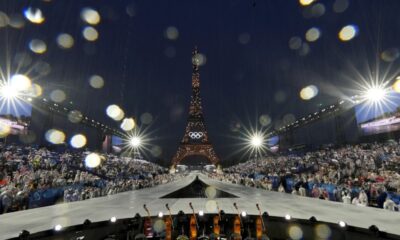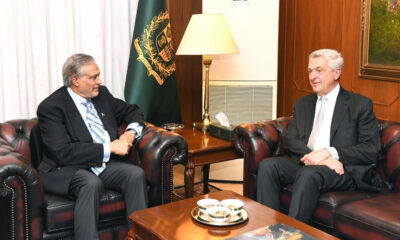World
Turkey faces runoff election with Erdogan leading
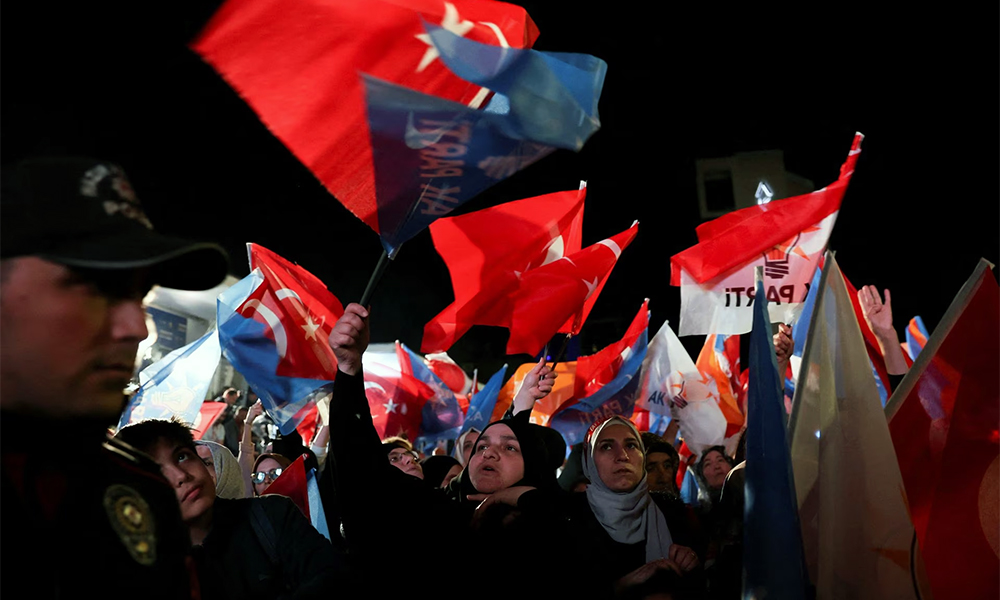
Turkey headed for a runoff vote after President Tayyip Erdogan led over his opposition rival Kemal Kilicdaroglu in Sunday’s election but fell short of an outright majority to extend his 20-year rule of the NATO-member country, Reuters reported.
Neither Erdogan nor Kilicdaroglu cleared the 50% threshold needed to avoid a second round, to be held on May 28, in an election seen as a verdict on Erdogan’s increasingly authoritarian path.
The presidential vote will decide not only who leads Turkey but also whether it reverts to a more secular, democratic path, how it will handle its severe cost of living crisis, and manage key relations with Russia, the Middle East and the West, read the report.
Kilicdaroglu, who said he would prevail in the runoff, urged his supporters to be patient and accused Erdogan’s party of interfering with the counting and reporting of results.
But Erdogan performed better than pre-election polls had predicted, and he appeared in a confident and combative mood as he addressed his supporters.
“We are already ahead of our closest rival by 2.6 million votes. We expect this figure to increase with official results,” Erdogan said.
With almost 97% of ballot boxes counted, Erdogan led with 49.39% of votes and Kilicdaroglu had 44.92%, according to state-owned news agency Anadolu. Turkey’s High Election Board gave Erdogan 49.49% with 91.93% of ballot boxes counted, Reuters reported.
Thousands of Erdogan voters converged on the party’s headquarters in Ankara, blasting party songs from loudspeakers and waving flags. Some danced in the street.
“We know it is not exactly a celebration yet but we hope we will soon celebrate his victory. Erdogan is the best leader we had for this country and we love him,” said Yalcin Yildrim, 39, who owns a textile factory.
The results reflected deep polarization in a country at a political crossroads. The vote was set to hand Erdogan’s ruling alliance a majority in parliament, giving him a potential edge heading into the runoff.
Opinion polls before the election had pointed to a very tight race but gave Kilicdaroglu, who heads a six-party alliance, a slight lead. Two polls on Friday showed him above the 50% threshold.
The country of 85 million people – already struggling with soaring inflation – now faces two weeks of uncertainty that could rattle markets, with analysts expecting gyrations in the local currency and stock market, Reuters reported.
“The next two weeks will probably be the longest two weeks in Turkey’s history and a lot will happen. I would expect a significant crash in the Istanbul stock exchange and lots of fluctuations in the currency,” said Hakan Akbas, managing director of Strategic Advisory Services, a consultancy.
“Erdogan will have an advantage in a second vote after his alliance did far better than the opposition’s alliance,” he added.
A third nationalist presidential candidate, Sinan Ogan, stood at 5.3% of the vote. He could be a “kingmaker” in the runoff depending on which candidate he endorses, analysts said.
The opposition said Erdogan’s party was delaying full results from emerging by lodging objections, while authorities were publishing results in an order that artificially boosted Erdogan’s tally.
Kilicdaroglu, in an earlier appearance, said that Erdogan’s party was “destroying the will of Turkey” by objecting to the counts of more than 1,000 ballot boxes. “You cannot prevent what will happen with objections. We will never let this become a fait accompli,” he said.
But the mood at the opposition party’s headquarters, where Kilicdaroglu expected victory, was subdued as the votes were counted. His supporters waved flags of Turkey’s founder Mustafa Kemal Ataturk and beat drums.
The choice of Turkey’s next president is one of the most consequential political decisions in the country’s 100-year history and will reverberate well beyond Turkey’s borders, Reuters reported.
A victory for Erdogan, one of President Vladimir Putin’s most important allies, will likely cheer the Kremlin but unnerve the Biden administration, as well as many European and Middle Eastern leaders who had troubled relations with Erdogan.
Turkey’s longest-serving leader has turned the NATO member and Europe’s second-largest country into a global player, modernised it through megaprojects such as new bridges and airports and built an arms industry sought by foreign states.
But his volatile economic policy of low interest rates, which set off a spiralling cost of living crisis and inflation, left him prey to voters’ anger. His government’s slow response to a devastating earthquake in southeast Turkey that killed 50,000 people earlier this year added to voters’ dismay.
Kilicdaroglu has pledged to revive democracy after years of state repression, return to orthodox economic policies, empower institutions that lost autonomy under Erdogan and rebuild frail ties with the West.
Thousands of political prisoners and activists could be released if the opposition prevails, read the report.
Critics fear Erdogan will govern ever more autocratically if he wins another term. The 69-year-old president, a veteran of a dozen election victories, says he respects democracy.
In the parliamentary vote, the People’s Alliance of Erdogan’s Islamist-rooted AKP, the nationalist MHP and others fared better than expected and were headed for a majority.
World
Barack and Michelle Obama endorse Harris in video of live call
Obama, the first U.S Black president, remains one of the most popular figures in the Democratic party even after more than a decade has passed since he was last elected.

Former President Barack Obama and his wife Michelle endorsed Kamala Harris’ bid for president on Friday in a roughly one-minute long video that captured a private phone call between the couple and the current vice president.
“We called to say Michelle and I couldn’t be prouder to endorse you and to do everything we can to get you through this election and into the Oval Office,” Obama told Harris.
“I am proud of you. This is going to be historic,” the former first lady told Harris.
Talking into a cell phone and cracking a few smiles, Harris expressed her gratitude for the endorsement and their long friendship.
“Thank you both. It means so much. And we’re gonna have some fun with this too,” Harris said.
The campaign said the video was the actual call, not a reenactment.
Harris’s surprise bid against Republican rival Donald Trump continues to gain steam from supporters, donors and politicians less than a week after President Joe Biden bowed out of the race amid slumping poll numbers.
Obama, the first U.S Black president, remains one of the most popular figures in the Democratic party even after more than a decade has passed since he was last elected.
Obama has lent his support to Biden during big-money fundraisers, which were among some of the biggest blockbuster events of his campaign.
The endorsement could help activate and sustain energy and fundraising for Harris’ campaign and it signals he is likely to get on the campaign trail for Harris once she is officially the presumptive nominee.
Obama initially withheld his endorsement even as Biden, his former vice president, anointed her as his heir apparent. Obama reportedly did not want to put his thumb on the scale as the party worked through the process of determining its nominee. – Reuters
World
Gaza ceasefire negotiations appear to be in closing stages, senior US official says
The senior U.S. official said both Biden and Harris are “completely aligned” on U.S. policy toward Israel and Gaza.

Negotiations on a ceasefire-for-hostages deal in the Gaza conflict appear to be in their closing stages and U.S. President Joe Biden and Israeli Prime Minister Benjamin Netanyahu will discuss remaining gaps on Thursday, a senior U.S. official said on Wednesday.
The official, briefing reporters ahead of their talks, said the remaining obstacles are bridgeable and there will be more meetings aimed at reaching a deal between Israel and Hamas over the next week, Reuters reported.
Hamas-led fighters stormed into southern Israel on Oct.7, killing 1,200 people and taking 250 captives, according to Israeli tallies, triggering a war in which more than 38,000 people in Gaza have been killed.
Hamas and other militants are still holding 120 hostages; Israel believes around a third of them are dead.
Months of stop-and-start talks have failed to produce a deal to gain release of some of the remaining hostages.
The senior U.S. official said both Israel and Hamas still have some issues to resolve but that a deal is close in which a six-week ceasefire would take place in exchange for the release of women, elderly men and wounded hostages over a 42-day period, read the report.
“It’s a very different negotiation now than just a month ago when we had some fundamentally unbridgeable issues,” the official said.
Biden will hold talks with Netanyahu and then later in the day Vice President Kamala Harris will have a separate meeting with the Israeli leader.
Harris has taken over as the presumed Democratic choice for the November presidential election against Republican Donald Trump, after Biden opted not to seek reelection again under pressure from Democrats concerned about his mental acuity.
The senior U.S. official said both Biden and Harris are “completely aligned” on U.S. policy toward Israel and Gaza, Reuters reported.
“The Israelis will hear full alignment,” the official said.
Related Stories:
UN Security Council backs Israel-Hamas ceasefire plan
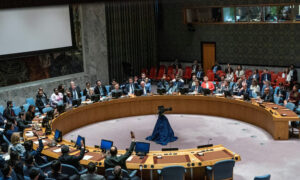
Biden says Israel-Gaza war should end now and Israel must not occupy Gaza
World
Harris bashes Trump over ‘fear and hate’ in debut rally
Harris ticked through a list of liberal priorities, saying that if elected she would act to expand abortion access, make it easier for workers to join unions and address gun violence, drawing a sharp contrast with Trump, the Republican nominee for president in the Nov. 5 election.
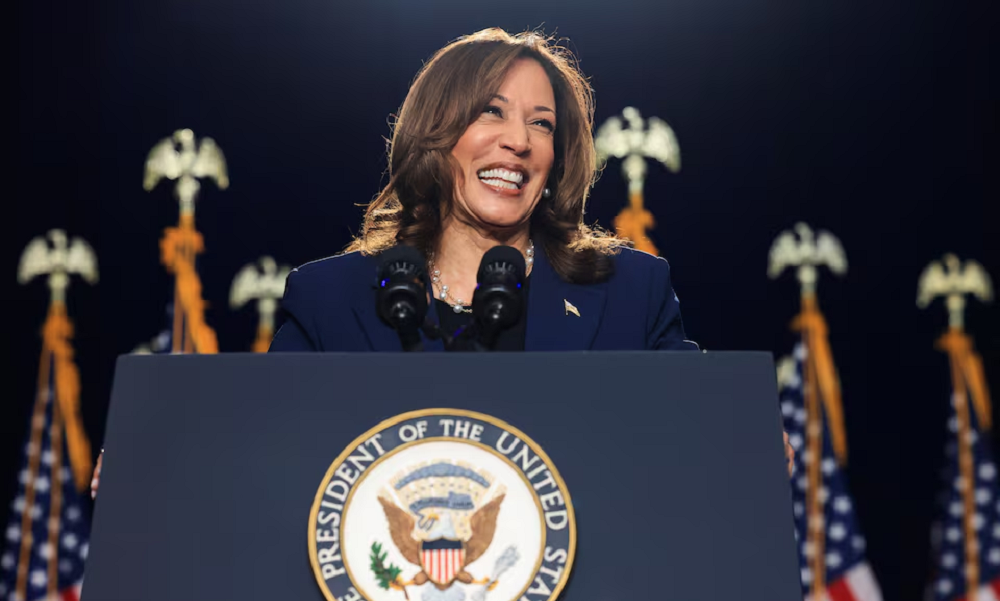
US Vice President Kamala Harris assailed Donald Trump on Tuesday at her first campaign rally since replacing President Joe Biden as the Democratic presidential candidate, while a Reuters/Ipsos opinion poll showed her taking a marginal lead over her Republican rival.
In a 17-minute speech, Harris aggressively went after Trump’s vulnerabilities, comparing her background as a former prosecutor to his record as a convicted felon, Reuters reported.
Harris ticked through a list of liberal priorities, saying that if elected she would act to expand abortion access, make it easier for workers to join unions and address gun violence, drawing a sharp contrast with Trump, the Republican nominee for president in the Nov. 5 election.
“Donald Trump wants to take our country backward,” she told a cheering crowd of several thousand at West Allis Central High School in a Milwaukee suburb in Wisconsin, a battleground state with a pivotal role in deciding the election outcome.
“Do we want to live in a country of freedom, compassion and rule of law, or a country of chaos, fear and hate?”
The raucous rally was a notable contrast to the smaller, more subdued events Biden held, underscoring Democrats’ hope that Harris, 59, can revive what had been a flagging campaign under Biden, 81.
The audience danced and waved Harris signs, while chants of “Ka-ma-la!” broke out when she took the stage.
Harris led Trump 44% to 42% among registered voters in the national Reuters/Ipsos poll, conducted on Monday and Tuesday after Biden dropped out of the contest on Sunday and endorsed Harris as his successor.
A Reuters/Ipsos poll last week showed Biden, before he ended his campaign, trailing Trump by two percentage points.
Both were within the poll’s three-point margin of error. But the results could signal limited movement in Democrats’ direction – and may suggest that Harris’ elevation to the top of the ticket blunted whatever momentum Trump hoped to gain from last week’s Republican National Convention, also in Milwaukee.
Trump and his allies have tried to tether Harris to some of Biden’s more unpopular policies, including his administration’s handling of the surge of migrants at the southern border with Mexico.
In a conference call with reporters on Tuesday, Trump expressed confidence in his ability to defeat Harris, noting that her previous presidential run in 2020 did not even survive until the first statewide nominating contest.
-

 Sport4 days ago
Sport4 days agoOlympics finally here; What you need to know
-

 Latest News5 days ago
Latest News5 days agoOCHA reports 110 die in landmine explosions in Afghanistan every month
-

 Regional5 days ago
Regional5 days agoChina braces for twin tropical cyclones after deadly flash floods
-

 Health4 days ago
Health4 days agoHealth partners provide services 589,205 people in Afghanistan in last month
-

 Latest News4 days ago
Latest News4 days agoAfghanistan’s Hajj ministry confirms death of 27 pilgrims in Mecca and Medina
-

 Business5 days ago
Business5 days agoConference on Islamic microfinance kicks off in Kabul
-

 Sport4 days ago
Sport4 days agoACB proposes ODI fixtures against top-tiered teams
-
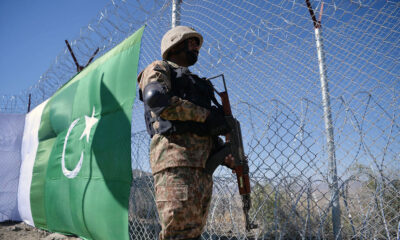
 Latest News4 days ago
Latest News4 days agoIslamabad claims three terrorists killed at Pakistan-Afghanistan border


